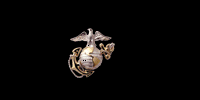DECLASSIFIED
Web site by Craig Slaughter © 2009
This is not an official USMC site.
OperationStarlite.com
(Transcribed from AP article, Sept. 1965 by Kilo Co. 3/3 L/Cpl Ed Nicholls)
Leathernecks in Vietnam Earn Right to
World War II Nickname
Editor's Note -- Paul Dean of the Arizona Republic and the Indianapolis Star was the only reporter to accompany U.S. Marines to the front lines during the battle on Van Tuong Peninsula last week. This is his account.
by Paul Dean, The Arizona Republic (Written for The Associated Press) Chu Lai, South Viet Nam (AP) --
The downey-chinned Leathernecks of the 2nd Battalion of the 4th Marine Regiment, earned the right to print a World War II Marine nickname in bold type.
"And you can quote me," said their commander, Lt. Col. Joseph (Bull) FISHER of Arlington, VA. "these men are truly magnificent."
For the 72 hour battle of the Van Tuong Peninsula -- Operation STARLITE -- 800 of FISHER's men, 80% of them just breaking out of their teens, had chewed and fought through rice paddies and dunes against the Viet Cong's 2,000 1st Regiment.
I watched as the young Leathernecks were smeared on the first day, rallied on the second and on the third routed their little adversaries in black pajamas.
We were lifted at dawn Wednesday in five waves of 20 HU34 helicopters to landing zones 12 miles south of Chu Lai. Carbine fire whanged through trees and bushes and men began to fall. To our right, Hotel Company was pinned down by machinegun fire and Marines were throwing themselves into ditches and hedgerows, their positions for the next 28 hours.
And in the middle of it all, FISHER stood up on a dike. "Come on you Marines this isn't Hotel Street and those ain't pin-ball machines shooting at you."
With air support and our own 81mm mortars hitting at VC bunkers to our front, two companies started their advance.
I climbed with Echo Company against a nameless pimple of a hill. The VC waited till almost two platoons had reached the naked crest, then zeroed in with 60mm mortars.
For 45 minutes we groveled in the dirt on that hilltop with only a spunky medical corpsman standing erect to attend the wounded. A while later he was killed by a bullet through the head. Of the 30 men who climbed the hill, only 18 walked out uninjured.
But the worst was still to come.
Echo Company advanced through a VC village with barbed wire entanglements, a honeycomb of foxholes, knapsacks and blue linen rolls of rice dumped on the ground. Echo Company was hit again. Small arms fire raked one platoon.
In a ditch where the medics piled the wounded, a fullback sized Marine sergeant screamed from a bullet wound in the ankle. At his side, an 18 year-old Marine with half his face blown away chewed at what was left of his lip and remained silent. But he uttered "Thank you" when a corpsman propped his head up against a bloody knapsack.
That evening we dug in. At battalion headquarters 15 miles away, Sgt Chuck CLAPPER, Seattle, WA, was standing nine hours on the telephone as he tallied KIA's --killed in action -- and WIA's wounded in action.
His reports included some senior NCO's, included one sergeant, a veteran of World War II and Korea, who had predicted "I figure I won't see this one out". The battalion didn't sleep that night.
A one man VC suicide squad was cut down as he tried to infiltrate our lines. He carried no rifle, but had a belt of U.S. made hand grenades.
Then FISHER spotted what he thought was a company of VC moving on a hill, a mile in front of our position. He called in heavy mortars.
At first light Thursday, the 2nd Battalion moved out. We swept through a deserted VC command post, capturing more grenades, land mines, old U.S. Army radios and a document later determined to be a VC communications plan.
In a dozen fire fights, 15 hard core VC troops fell. Thirty-one Communists were captured and that evening were airlifted back to Vietnamese authorities for interrogation.
"Look at those miserable little runts," growled an MP guard. "They don't look like they have the strength to lift a rifle, let alone stand up against a battalion of U.S. Marines."
It was another sleepless night at the command post. Only two companies remained to finish our part of Operation Starlite. But during the night the battalion faced a new threat.
Twice we nearly came under fire from our own guns -- once where aircraft strafed only 300 yards in front of our positions and when naval artillery began lobbing shells over our heads. Only "flash" emergency radio messages from Col FISHER saved Marine lives.
Friday morning was clammy and the men had c-ration breakfasts of ham and lima beans and coffee heated over burning plastic explosives.
Then Sgt. Edward GARR, 33, Oaklawaha, FL., yelled a radio message to Col. FISHER. "Message from starboard...'helos (helicopters) on way -- commence retraction'."
By helicopter and jeep I hitched a ride back to Chu Lai to await a C130 transport aircraft bound for Da Nang.
There were other Marines waiting for that flight. But these men were zippered in olive green rubber sacks.
They had been killed in action.
SEMPER-FI!
Ed W. NICHOLLS
Archivist
Starlite Survivor's
(RVN) Association, Inc
Republic of South Vietnam - August 1965

